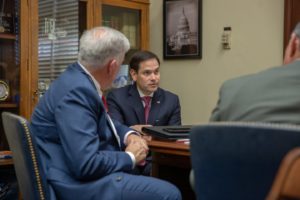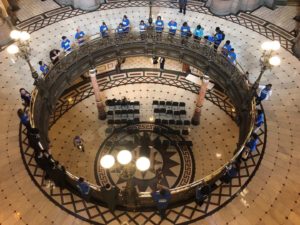Religious freedom proponents push back on Build Back Better Act childcare language
In late October President Joe Biden announced the framework for his “Build Back Better” legislation, which would cost taxpayers close to $5 trillion over the next decade. The bill, which passed…

In late October President Joe Biden announced the framework for his “Build Back Better” legislation, which would cost taxpayers close to $5 trillion over the next decade. The bill, which passed the House of Representatives on November 19, includes spending in child care and universal preschool, but faith leaders say a closer look shows risks for religious and faith-based preschools.
Child care is a significant issue for American families: it’s estimated that a third of working-parent households in the US use center-based care, and 53% of those families use a child care center that is affiliated with a faith organization.
Under Build Back Better, the Biden Administration promises universal and free preschool for all 3- and 4-year-olds and funding for parents to send children to high-quality preschools in the setting of their choice – from public schools to private child care providers to the federal Head Start program.
At issue is the bill’s original language, which states that “childcare certificates shall be considered Federal financial assistance to the provider” and the universal preschool language, which states that “any program or activity that receives funds” under the program is subject to the non‐discrimination provisions of several federal laws.
Those discrimination provisions raised concerns with religious freedom advocates and faith-based child care providers. Critics say incorporating Head Start’s discrimination provisions could prevent religious providers from only hiring teachers who share their beliefs — including fundamental religious doctrine.
According to Jennifer Daniels at the U.S. Conference of Catholic Bishops, “The Build Back Better legislation differs from other federal early childhood programs in that it treats providers as recipients of federal assistance and adds new compliance obligations without any protections for faith‐based providers. Religious schools should not have to choose between retaining their religious independence and participating in childcare and preschool programs that are available to secular providers.”
Earlier this month, U.S. Senator Tim Scott (R-S.C.), Senator Richard Burr (R-N.C.) and Senator Susan Collins (R-Maine), held a roundtable with private and religious child care providers from around the country to hear their concerns about the bill.
At the same time, a coalition of faith organizations representing Christian, Jewish, and Muslim groups sent Sens. Patty Murray (D-WA) and Senator Burr a letter expressing their concerns about the legislation.
“The faith community has always affirmed that parents should choose the best environment for care and education of their children,” the letter reads. “The current Build Back Better Act provisions would severely limit the options for parents, suffocate the mixed delivery system for child care and pre-kindergarten, and greatly restrict the number of providers available for a successful national program.”
The unified voices of religious freedom advocates appear to be heard: over the weekend, the Senate’s Health, Education, Labor and Pensions (HELP) Committee released an updated draft of the Build Back Better Act that includes changes to the child care and preschool provisions.
In the latest draft of the bill, the Senate removed the language designating child care aid as federal financial assistance to child care providers, and also removed the provision that subjected child care and preschool funding to additional antidiscrimination requirements under the 2007 Head Start Act. Faith-based education proponents had argued that could exclude single-sex programs and prevent providers from giving preference to families that share their faith.
Advocates for choice in child care and preschools aren’t sure the changes are enough, and continue to monitor the bill’s progress.
“For more than 30 years, there’s been a bipartisan coalition here in Washington that has included faith-based child care as a part of the remedies available for families,” said Senator Tim Scott. “I think we ought not politicize this issue, because to me this is not an issue of Left versus Right. This is an issue of American families looking for ways to make decisions in their households, and [this plan would] take away options by making it unaffordable.”



